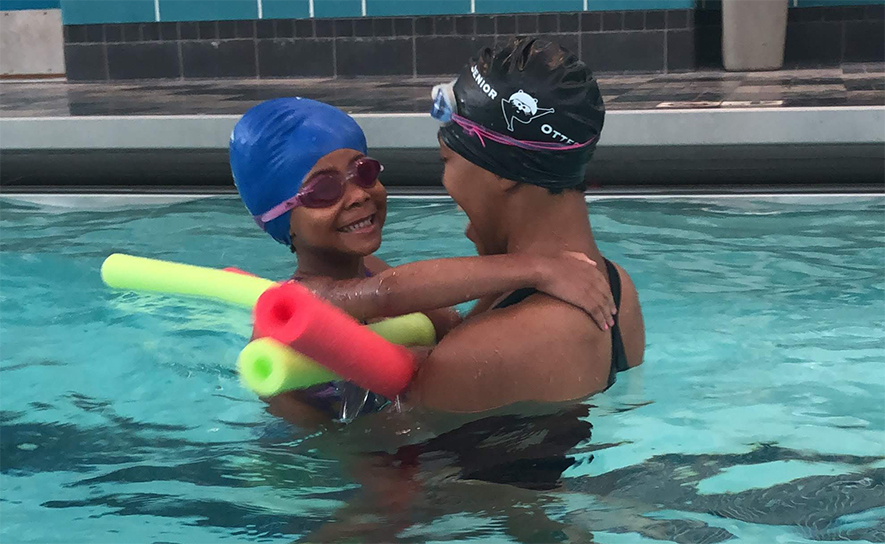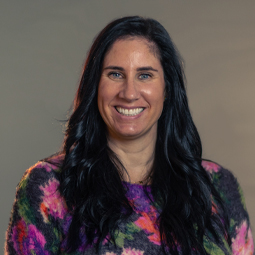USA Swimming News
Tuesday, May 11, 2021
Taking the Dive: How Past Swimming Experiences Can Shape Future Generations

Ayanna Rakhu grew up in St. Louis, Missouri, where she learned to swim at 6 years old. After falling in love with the water, she tried swimming competitively until she was 12.
“I loved swimming but hated competing,” Rakhu realized.
 Her love of the water inspired her to get involved with aquatics in other ways, including lifeguarding at the local pool and currently being a part-time coach for Life Time Swim Team (LIFE). Rakhu has continued to push herself outside of the pool, earning a B.S. in Athletic Training, a M.S. in Sport Psychology and, most notably, currently working towards her Ph.D. in Kinesiology at the University of Minnesota-Twin Cities.
Her love of the water inspired her to get involved with aquatics in other ways, including lifeguarding at the local pool and currently being a part-time coach for Life Time Swim Team (LIFE). Rakhu has continued to push herself outside of the pool, earning a B.S. in Athletic Training, a M.S. in Sport Psychology and, most notably, currently working towards her Ph.D. in Kinesiology at the University of Minnesota-Twin Cities.
Having sports be a part of her life growing up taught her many valuable skills, but it wasn’t until her daughter started swim lessons that she noticed other Black mothers weren’t swimming.
“I felt this urge to get back into the water when I was pregnant,” Rakhu said. “I soon realized Black mothers aren’t swimming, so therefore Black kids aren’t swimming.” She quickly became interested in the reasoning behind what was keeping Black mothers away from the water and decided to complete her PhD dissertation on the topic.
Gathered from focus groups and interviews with African American mothers, preliminary findings in her research show a vital aspect missing from learn to swim programs is a pre-evaluation. Pre-evaluations can ask questions about the swimmer and parents' water history, any traumas they might hold around the water as well as their proficiency in the water. Instructors can use pre-evaluations to help swimmers and their parents both feel more relaxed, calm and ready for swim lessons. Although Rakhu’s dissertation focuses on adults, a pre-evaluation can be tailored to help swim lessons for all ages and abilities.
“If a mother is afraid of the water, the swim lesson instructor should be aware of that fear and be able to approach the lesson differently.” And that fear, when not addressed, could result in generations of families never learning how to swim. A USA Swimming Foundation study conducted by the University of Memphis and University of Nevada – Las Vegas showed that if a parent or guardian doesn’t know how to swim, there’s only a 19% chance the child will learn how to swim.
Rakhu believes her findings could create a new framework for swim lesson providers — one that can help guide the development of new curriculum that is culturally relevant, trauma informed and anxiety sensitive. She wants to transform the way swim lesson providers teach swim lessons to Black families, which could ultimately encourage Black mothers to feel comfortable getting their own children in swim lessons.
Learn more on how to get involved with saving lives through swim lessons through the USA Swimming Foundation here.
“I loved swimming but hated competing,” Rakhu realized.
 Her love of the water inspired her to get involved with aquatics in other ways, including lifeguarding at the local pool and currently being a part-time coach for Life Time Swim Team (LIFE). Rakhu has continued to push herself outside of the pool, earning a B.S. in Athletic Training, a M.S. in Sport Psychology and, most notably, currently working towards her Ph.D. in Kinesiology at the University of Minnesota-Twin Cities.
Her love of the water inspired her to get involved with aquatics in other ways, including lifeguarding at the local pool and currently being a part-time coach for Life Time Swim Team (LIFE). Rakhu has continued to push herself outside of the pool, earning a B.S. in Athletic Training, a M.S. in Sport Psychology and, most notably, currently working towards her Ph.D. in Kinesiology at the University of Minnesota-Twin Cities. Having sports be a part of her life growing up taught her many valuable skills, but it wasn’t until her daughter started swim lessons that she noticed other Black mothers weren’t swimming.
“I felt this urge to get back into the water when I was pregnant,” Rakhu said. “I soon realized Black mothers aren’t swimming, so therefore Black kids aren’t swimming.” She quickly became interested in the reasoning behind what was keeping Black mothers away from the water and decided to complete her PhD dissertation on the topic.
Gathered from focus groups and interviews with African American mothers, preliminary findings in her research show a vital aspect missing from learn to swim programs is a pre-evaluation. Pre-evaluations can ask questions about the swimmer and parents' water history, any traumas they might hold around the water as well as their proficiency in the water. Instructors can use pre-evaluations to help swimmers and their parents both feel more relaxed, calm and ready for swim lessons. Although Rakhu’s dissertation focuses on adults, a pre-evaluation can be tailored to help swim lessons for all ages and abilities.
“If a mother is afraid of the water, the swim lesson instructor should be aware of that fear and be able to approach the lesson differently.” And that fear, when not addressed, could result in generations of families never learning how to swim. A USA Swimming Foundation study conducted by the University of Memphis and University of Nevada – Las Vegas showed that if a parent or guardian doesn’t know how to swim, there’s only a 19% chance the child will learn how to swim.
Rakhu believes her findings could create a new framework for swim lesson providers — one that can help guide the development of new curriculum that is culturally relevant, trauma informed and anxiety sensitive. She wants to transform the way swim lesson providers teach swim lessons to Black families, which could ultimately encourage Black mothers to feel comfortable getting their own children in swim lessons.
Learn more on how to get involved with saving lives through swim lessons through the USA Swimming Foundation here.
Related Articles
ARTICLE
WHM: 20 Years of US Women Leading the World at International Competitions
Mar 24, 2025
ARTICLE
How Whitney Stortz Overcame Fear for Swimming
Mar 19, 2025
ARTICLE
Statement from the Board of Directors of USA Swimming
Mar 1, 2025
ARTICLE
Suburban Seahawks Win 2024 Swim-a-Thon Grand Prize
Feb 28, 2025
ARTICLE
Kick Set Podcast | Episode 75: Georgia Associate Head Coach Mike Norment on Coaching Tips, Philosophy, Sets, and Stories
Feb 27, 2025
ARTICLE
USA Swimming Announces 2025 World Aquatics Junior Swimming Championships Coach Selection Framework
Feb 25, 2025
ARTICLE
Deep Dive: A Look Back on the Desegregation of Pools in America
Feb 24, 2025
ARTICLE
Three Additional Coaching Network Webinars are Live on USA Swimming University
Feb 14, 2025
ARTICLE
Pacific Swimming Diversity, Equity, and Inclusion Athlete Representative Provides Free Resource for Inclusion in Swimming
Feb 13, 2025

